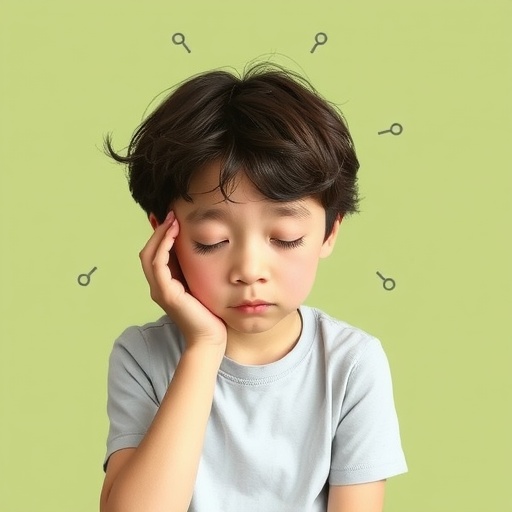In a groundbreaking study spotlighting the intricate interplay between depressive disorders and obsessive-compulsive symptoms (OCS) in youth, researchers have illuminated new dimensions in adolescent mental health. Published in BMC Psychiatry, the study delves into the prevalence of OCS among adolescents diagnosed with major depressive disorder (MDD), uncovering not only the frequency of this co-occurrence but also its profound clinical and psychological correlates, notably the pervasive impact of childhood trauma.
Obsessive-compulsive symptoms, characterized by intrusive thoughts and repetitive behaviors, have long been observed alongside depressive conditions. Yet, the extent and significance of their overlap during the critical developmental phase of adolescence have remained tenuous. This extensive investigation enrolled 190 adolescent patients diagnosed with MDD, systematically assessing the presence and severity of OCS through standardized tools including the Yale-Brown Obsessive-Compulsive Scale (Y-BOCS). The findings were striking: over one-third of these young individuals exhibited clinically significant obsessive-compulsive symptoms, underscoring a prevalent but often overlooked comorbidity.
Crucially, the study’s methodology extended beyond mere symptom cataloging. By employing comprehensive psychometric assessments such as the 17-item Hamilton Rating Scale for Depression (HAMD-17), alongside the Adolescent Self-Rating Life Events Check (ASLEC) and Child Trauma Questionnaire (CTQ), researchers embarked on a multifaceted exploration of how these symptoms intersect with environmental and emotional histories. This enriched clinical data allowed for robust correlations that revealed OCS’s intricate linkage to more severe depressive episodes and previously uncharted connections to traumatic childhood experiences.
Among the most salient discoveries was the pronounced relationship between childhood trauma—particularly emotional abuse—and the likelihood of OCS manifestation within depressive adolescents. This correlation suggests neurodevelopmental and psychosocial sequelae that may predispose vulnerable individuals to a dual burden of psychiatric symptoms. The intricate neurobiological underpinnings of this association may involve dysregulations in stress response systems and neurocircuitry governing compulsivity and mood regulation, providing potential avenues for targeted interventions.
Further clinical distinctions emerged when comparing adolescents with MDD both with and without OCS. Those presenting with obsessive-compulsive symptoms tended to have poorer family dynamics and earlier onset of depressive episodes. Such factors are known to exacerbate psychiatric morbidity by disrupting emotional regulation and resilience mechanisms, often hindering treatment efficacy and recovery trajectories. The heightened depressive severity in this subpopulation amplifies the urgency for early identification and tailored therapeutic strategies.
The implications of these findings ripple beyond clinical practice into educational and social domains. Adolescents grappling concurrently with MDD and OCS experience compounded impairments in academic performance and social functioning, underscoring the need for collaborative efforts among caregivers, educators, and mental health professionals. Public health policies must prioritize screening protocols that encompass multifaceted symptom profiles and trauma histories to mitigate long-term psychosocial consequences.
Moreover, this research challenges the traditional compartmentalization of psychiatric conditions, emphasizing the necessity for integrated diagnostic frameworks. The overlapping symptomatology of OCS within depressive disorders demands treatment paradigms that transcend singular symptom targets, embracing a broader neuropsychological perspective. Pharmacological regimens, combined with psychotherapeutic interventions such as cognitive-behavioral therapy specifically adapted for comorbid presentations, may enhance clinical outcomes.
Notably, the study’s logistic regression analysis highlights the predictive value of early trauma exposure and depression severity in anticipating the onset of obsessive-compulsive symptoms. This predictive capability offers clinical practitioners critical insights into patient risk stratification, enabling proactive monitoring and intervention before symptom exacerbation. Such foresight is indispensable in adolescent psychiatry, where timely therapeutic engagement can alter lifelong mental health trajectories.
From a neuroscientific viewpoint, the intersection of trauma-related stress pathways and compulsive behaviors invites further inquiry into epigenetic modifications and neuroplasticity mechanisms during adolescence. Understanding how adverse experiences reshape neural circuits implicated in compulsivity and mood disorders is paramount for developing innovative, precision-based treatments. This study thus serves as a clarion call for multidisciplinary research bridging psychiatry, neuroscience, and developmental psychology.
Conclusively, the revelation of a significant subset of depressed adolescents concurrently battling obsessive-compulsive symptoms and the influential role of childhood trauma compels a paradigm shift in mental health approaches. There is an urgent need to foster awareness among families, healthcare providers, and society at large about the complex nature of these intertwined conditions. Early detection, comprehensive assessment, and multifaceted intervention strategies are essential prerequisites for improving prognosis and quality of life for this vulnerable population.
The research by Liu, Sun, Feng, and colleagues propels the field forward by elucidating nuanced clinical profiles and spotlighting previously underrecognized contributing factors. Their work underscores the latent burden borne by adolescents navigating the challenges of depression compounded by obsessive-compulsive symptoms—a dual struggle that necessitates vigilant attention and dedicated resources. As the scientific community continues to unravel the mysteries of adolescent psychopathology, studies like this pave the way towards more effective, empathetic, and individualized care models, offering hope to countless young lives affected by these debilitating disorders.
Subject of Research: Obsessive-compulsive symptoms in adolescents with major depressive disorder and their association with childhood trauma.
Article Title: Obsessive-compulsive symptoms in adolescents with major depressive disorder: prevalence, clinical correlates, and association with childhood trauma.
Article References: Liu, Z., Sun, X., Feng, Y. et al. Obsessive-compulsive symptoms in adolescents with major depressive disorder: prevalence, clinical correlates, and association with childhood trauma. BMC Psychiatry 25, 906 (2025). https://doi.org/10.1186/s12888-025-07380-4
Image Credits: AI Generated
DOI: https://doi.org/10.1186/s12888-025-07380-4




